Introduction
On 28 May 2020, eight women at least with a newborn were found held in a military headquarters of the Hamza/Hamzat Division affiliated to the National Army, operating under the Turkish-backed Syrian Coalition of the opposition. It was by chance when outraged people stormed the headquarters, which is based in Afrin, responding to an attack carried out by the Hamza Division on a shop in the city, which resulted in the killing and the injury of at least five people.
The found detained women, were handed over to the Military Police of the National Army, to be brought before the court, as supposed. But, the Military Police, however, returned them to the Hamza Division, which removed them to an unknown place.
STJ has followed up on the issue with an aim to identify the detained women, meeting more than ten military commanders and security officials in the National Army, the Hamza Division and the Military Police. However, most of those met refrained from providing any information in compliance with orders from Turkey to not to disclose any detail about the detained women and their fate. Nevertheless, three of the sources confirmed that the women are being tried by the military court, while another said that they were removed to Turkey; there is no factual evidence to support any of the allegations.
Actually, the women’s fate is still unknown at the date of this report; early July 2020. It is worth mentioning that two sources from the Military Police,[1] confirmed to STJ that the Hamza Division re-took the women only two days after they were found and that it was most likely that they were transferred to a prison in Turkey. Knowing that armed groups of the National Army had earlier transferred Syrian prisoners to Turkey, committing gross violation in accordance with Article 147 of Geneva Convention IV.[2]
The methodology of the report
For this report, STJ met more than 15 witnesses and sources, among them relatives of the women detainees, officials in the Military Police, commanders in the National Army and civilians, who witnessed the attack by the Hamza Division on civilians, which led to an outrage and consequently the found of the women who had been forcibly disappeared for over a year. STJ has also reviewed written and photographic materials on the issue from open sources and verified the information cited, and it will continue in its inquiries to publish an integrated report on this issue.
1. Who are the women in detention and how were they arrested?
Eight women appear in a video filmed while the Military Police was getting the detainees out from the headquarters of the Hamza Division.[3] STJ managed to identify seven of them and to document the merits of their detention in its database and it is working on the identification of the eighth woman and the three others who were reportedly held in the same headquarters, as a civilian confirmed that there were 11 women (Arabs and Kurds) held in the headquarters. The detainees who appeared in the video were: (1. Lonjen Abdo. 2. Rojen Abdo 3. Roshan Amouni 4. Haifa Al Jasim 5. Nowruz Abdo 6. Rokan Munla 7. Aren Deli 8. Nadia Suleiman).
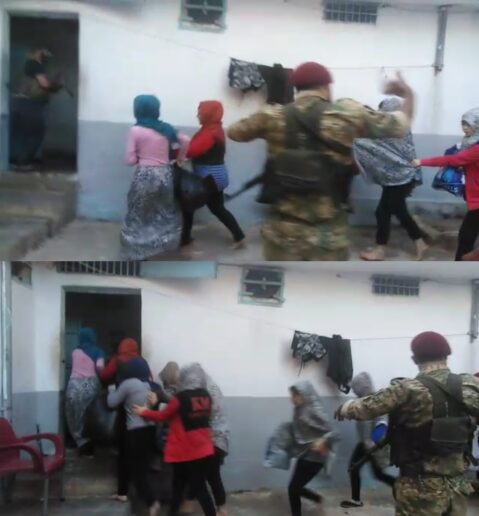
Image 1- a screenshot from the abovementioned video shows the women detainees who were found held in a headquarters of the Hamza Division in the city of Afrin on 28 May 2020.
1. Further details on the arrests of women
- On 25 June 2018, Lonjen Abdo, a Kurdish born in 1995, was arrested with her father Mohammad Khalil Abdo, from their home in the village of Kurrka Jerin by the 12th Division affiliated to the Sultan Murad Division of the National Army.
- Rojen Abdo, sister of Lonjen, born in 2001, was arrested two weeks after the arrest of her father and sister, from the family’s home in the village of Kurrka Jerin by the 12th Division; knowing that the three arrested without charges against them.
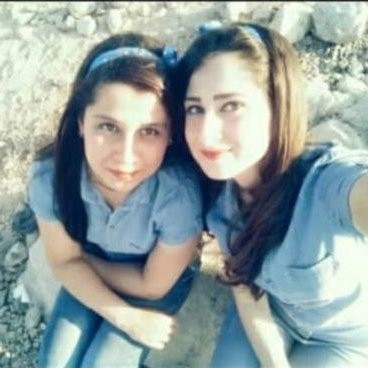
Image 2- Lonjen and Rojen Abdo.
- On 5 April 2018, Rokan Munla, a Kurdish, was arrested – she was then 27 and two months pregnant – with her husband Kawa Jamal, 35, from their home in the village of Juwayq of Afrin, by the Rokan gave birth to her son in detention.
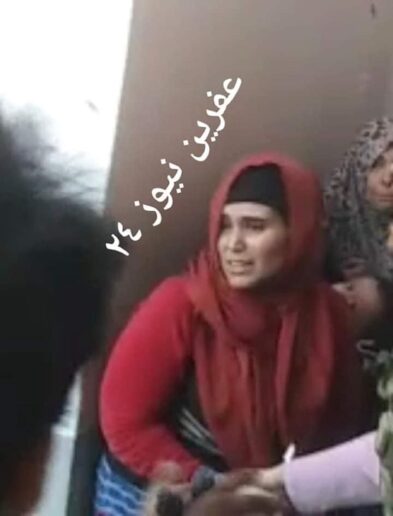
Image 3- a screenshot from the video filmed while finding the women detainees, shows Rokan Munla with the head of her newborn appears on the right. 28 May 2020.
- On 9 June 2018, Roshan Mohammad Ameen Amouni, a Kurdish born in 1976, was arrested along with three members of her family from their home in the village of Dargirê of the Maabatli district, by the Hamza Division. The latter asked relatives of Roshan to pay 15 thousand USD for her release alone (it is evidence that the arrest was carried out arbitrarily in order to blackmail the family). The family, however, couldn’t secure the amount requested and the fate of all those detained is still unknown without any charges being brought against them. People arrested with Roshan were:
-
- Lawand Abdul-Aziz Haji Mustafa, a former fighter of the People’s Protection Units (YPG), born in 2005.
- Mohammad Ameen Abdul-Aziz Haji Mustafa, a former fighter of the YPG, born in 1997.
- Abdul-Aziz Abdul-Hannan Haji Mustafa, Roshan’s husband, born in 1969. He was the guard of the Military Hospital during the period of the Autonomous Administration’s control.
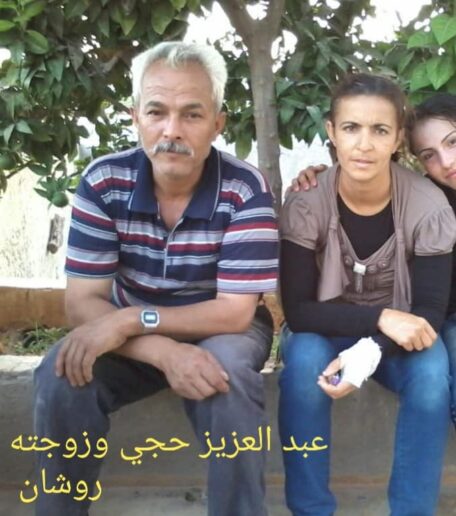
Image 4- Roshan Amouni with her husband Abdul-Aziz Haji.
- On 1 September 2018, Nowruz Anwar Bakr Abdo, a Kurdish born in 2001, was arrested with her father, Anwar Bakr, from their home in the town of Rajo in Afrin, by the Levant Front/al-Jabha al-Shamiya, in control of the town. Members of the latter stormed the same home after three days and arrested Nowruz’ brother, Mohammad, 16. Nowruz’ father was released after 20 days and her brother after three days of detention, while she was set free after the circulation of the aforementioned video.
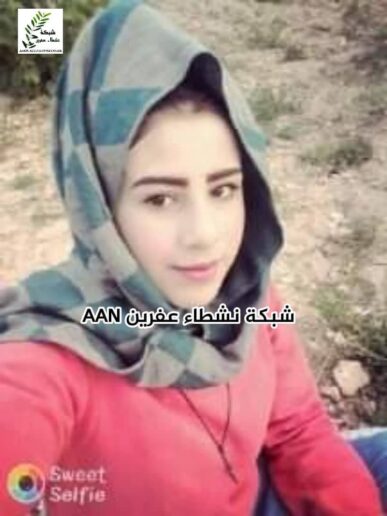
Image 5- Nowruz Anwar Bakr Abdo.
- Nadia Hasan Suliman, a 20-year-old Kurdish from the village of Qizilbaşa of Bulbul district, was arrested with two friends (a man and a woman) by unidentified persons. In May 2018, prior to her arrest, Nadia’s husband, Ahmed Rasheed, 24, was arrested at a checkpoint on Afrin- Kafr Janneh road. Two weeks after Ahmed’s arrest, Nadia got an anonymous call and was told that her husband was held in Sajo prison in the city of A’zaz and that she could visit him. Indeed, she went there with her friends and the contact lost with them since then. Nadia was found in the headquarters of the Hamza Division, while the rest are still unaccounted for.
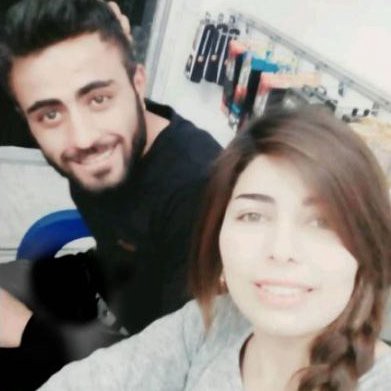
Image 6- Nadia Hasan Suliman and her husband Ahmed Rasheed.
- Haifa al-Jasem, an Arab, (we couldn’t obtain further information about her) was arrested by the Hamza Division, as reported by Ezdina website, which closely follows the news of Afrin, but with no mention of when and where she was arrested. Haifa used to serve as a nurse at the Evren Hospital before Turkey took control of the region, and this was likely the direct reason for her arrest.
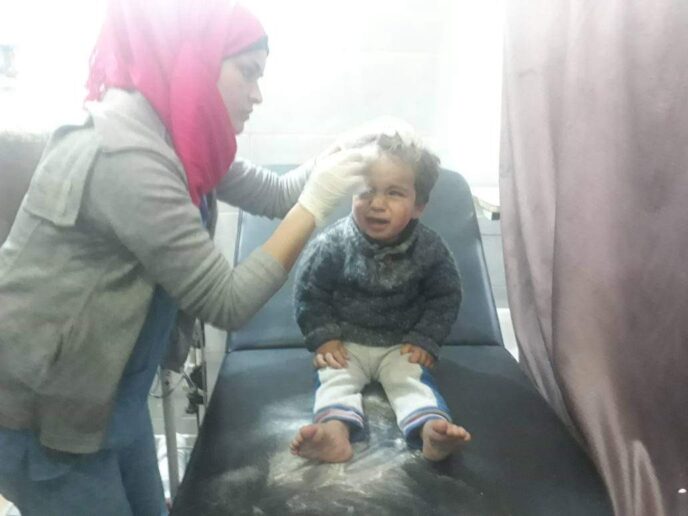
Image 7- Haifa al-Jasem while treating a child.
- On 27 February 2020, Aren Deli, a 21-year-old Kurdish, was arrested from her home in the village of Kimar by members of the Hamza Division headed by Abu Shaher, as reported by Ezdina news website.
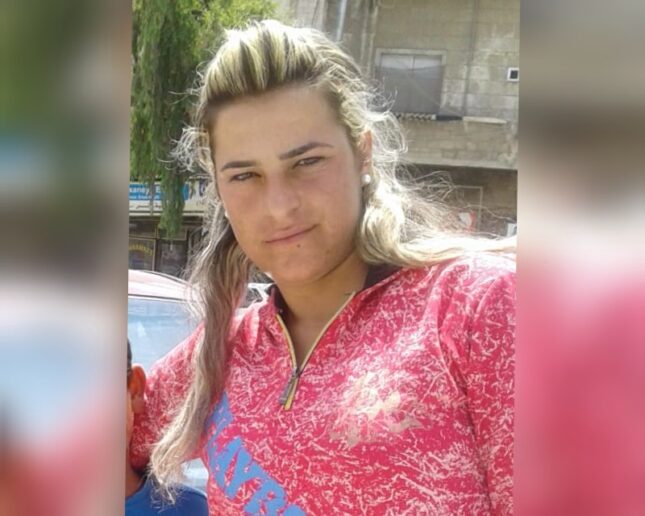
Image 8- Aren Deli.
STJ met an official in the Military Police of Afrin, who witnessed the incident, he detailed:
“After the circulation of the video, which shows the women detainees, and after the Military Police removed them from the headquarters of the Hamza Division, a member of the Afrin Liberation Forces (HRE), (a kurdish group loyal to Turkey, which is different from the Afrin Liberation Forces faction which carries out attacks against Turkish forces and opposition groups in Afrin), came to me saying that his sister appears in that video and that she was kidnapped and disappeared more than a year ago. He was really mad when he found out that his sister is held by the Hamza Division, as he went to them several times since her disappearance but they had always denied knowing her. He demanded the release of his sister, but that never happened.”
2. About the Hamza/Hamzat Division
On 24 April 2016, the first lieutenant Saif Abu Bakr announced the formation of the Hamza Division by the merge of five brigades in northern rural Aleppo, which are: the Hamza Brigade, the Dhi Qar Brigade, the Northern Thunder Brigade, the Mare’ Resistance Brigade and the Special Operations Brigade. Several months later the Samarkand Brigade joined the Division but split from it later.
The Hamza Division (the 22nd Division), is supported by Turkey and is a part of the 2nd Corps of the Turkish-backed Syrian National Army, operates under the Interim Syrian Government formed through the western-backed Syrian Coalition of the opposition.
2. How were the women detainees found and what is their fate?
On 28 May 2020, members of the Hamza Division in the city of Afrin, attacked a displaced man from eastern Ghouta, in Damascus suburbs, holding weapons; personal and grenades. The attack resulted in the death of a displaced man and a child and the injury of at least four others. In response, civilians and armed displaced people, from eastern Ghouta, surrounded and stormed headquarters of the Hamza Division in the street of al-Mahmoudia, aiming at arresting those who conducted the attack, which claimed victims.
However, members of the Hamza Division managed to flee from a back door to the headquarters, leaving the detained women to be found by the people attacking, who called the Military Police to intervene and take the detainees.
A source from the Military Police asserted to STJ that the latter took the detained women after the headquarters of the Hamza Division was stormed, and handed them over again to the Division after two days. He also confirmed that the women’s arrests were made with the knowledge of the Military Police, and that the Hamza Division usually arrests men and women and transfers them to Turkey.
Another source from the Military Police explained that those women were arrested on charges of carrying out bombings and the affiliation to the YPG or the Kurdistan Workers’ Party (PKK):
“Since the arrests were made separately and by several groups, it is likely that the detainees were placed temporarily at the headquarters of the Hamza Division in order to remove them to Turkey later. After taking those women detainees, we handed them over again to the Hamza Division.”
STJ field researcher was informed by a witness that the Hamza Division took the women detainees to a headquarters of it in the al-Ahlam Mountain near Afrin. It should be noted that only Nowruz Anwar Bakr Abdo was released.[4]
3. The armed groups’ statements on the fate of the women detainees
STJ asked the Major Yousif al-Hammoud, the spokesman for the National Army, about the fate of the women detainees, but he initially denied any knowledge about this matter, and promised to respond as soon as he got informed about it. He later stated that members of the Hamza Division acted alone by holding women in the headquarters, and that those members with the head of the headquarters are under investigation and will be held accountable. The last statements STJ could obtain from al-Hammoud assured that the women were transferred to the Military Police and that they would be brought before the Military Court, without mentioning the charges against them.
An official of the Military Police explained to STJ:
“Authorities here usually publicly announce judgments against people who are found guilty of any assault. But what actually happens is that those people are only put out of sight for a short period without being imprisoned or they may be transferred to the cities of Ras al-Ayn/Serê Kaniyê and Tell Abiad to calm conditions in Afrin.”
We also met the overall military commander of the Hamza Division, Abdullah Halawa, who denied the knowledge of details on the incidents and the fate of the women detainees – knowing that he is the representative and negotiator of the Hamza Division to resolve the outstanding issue between it and civilians in the city of Afrin – but he only provided that they were handed over to the Military Police. He promised, however, to detail STJ later or to let us contact the official responsible of the case to follow up the updates of the women detainees. Nevertheless, that official didn’t respond to the numerous calls made later by our team. Further, STJ met a media worker – he asked anonymity – in the Hamza Division, he said:
“The security commanders of the Division and Turkey are the parties in this case. The charges against the women detainees are; spying for the Autonomous Administration and providing it with military information as well as the involvement in earlier bombings.”
The following officials were all met by STJ but refrained to provide any information about the issue and the fate of the women detainees:
- An officer in the Military Police in Afrin, calling himself Abu Haidar. He denied knowing about the case, justifying that it is not within his jurisdiction.
- Colonel Abu Riyadh, the chief of Military Police in Afrin; we asked him whether the arrested women were brought before the court or not, he replied: “if you want me to give a statement, I will not do that. But I will listen to you if you have a complaint or a grievance. Sorry, we are not allowed to make any secret or public statements.”
- Ahmed al-Kurdi: a colonel in the Military Police in Afrin, he said:
“We, the Military Police, have no problem to disclose any detail about the male or female detainees we hold. You should know that we allow families of all detainees to visit them after the latter being tried. We have nothing to hide and any revolutionary journalist can visit our centers and get the simple and general information you requested, but excuse me, I cannot answer anything on the phone.”
- Chairman of Afrin Court, who also denied any knowledge of the issue, saying:
“I have no idea about this issue. You can talk to the public prosecutor. If I knew anything I would answer; our judiciary is transparent, we have nothing to hide.”
- Abu al-Kheir, an employee in the central administration of the Afrin Court. We asked him if the women were brought before the judge or not, he answered: “here is a civilian court and we have nothing to do with any military group. There are competent military tribunals. Personally, I know nothing about their fate. “
4. Other women held by the Turkish-backed National Army
In Afrin alone, STJ, in cooperation with local activists, documented the arrest of 21 women between early 2020 and its late June. Those arrests were made arbitrarily by the National Army and its Military Police, without clear charges and without families being informed about the detention place of their daughters. Some of the detainees were released for varying fines while four of them are still unaccounted for.
STJ has followed up the issue of those women detainees and met, in this context, more than four sources and commanders in the National Army in July 2020, who provided STJ with the following information:
- Rankeen Ahmed Abdu, from the village of Kareh in Bulbul district, was arrested by the Civilian Police on 14 January 2020. According to one of the sources met by STJ, she is now held in a headquarter of the Hamza Division in the town of Rajo on charges of spying on the National Army and Turkey and joining the PKK. She was interrogated by the Turkish intelligence but has not tried yet.
- Rasheda (we could not know her last name), from the village of Shoryah in Maabatli district, was arrested on 5 February 2020 by the Military Police. According to the same source, Rasheda is accused of joining the YPG, and she was taken to Shankal detention center after being interrogated by the Turkish intelligence in the village of Qara Baba.
- Silvana Abdul-Rahman Qara Jool, was arrested by the Civilian Police in June 2020. The source said that she is accused of forming a cell affiliated with the PKK, and he confirmed that she was been tortured after searching her cell phone and finding chats and voice messages talking about this matter. She was also accused of receiving funds to pay women she used as spies on the National Army to send photos and locations of its members and checkpoints. Silvana is held temporarily in the headquarters of the Hamza Division on Rajo to be transferred to Turkey later.
- Zeinab Mohammad Abeesh, was arrested from Afrin by the Military Police (the commandos), while in her last month of pregnancy, on 12 June 2020, on charges of being involved in introducing car bombs to Afrin and in facilitating the flee of Kurdish people wanted for the National Army to Aleppo. Zeinab was interrogated by the Turkish intelligence and is held in a headquarters on the Hamza Division in the al-Ahlam Mountain near Afrin.
We must mention that we could not validate the accusations leveled against the four women detainees from their relatives or from other independent sources, but we will make updates as soon as we receive further information.
5. Details on the attack carried out by the Hamza Division against civilians
This incident occurred on 28 May 2020, in a supermarket in the al-Mahmoudia street, rented by a displaced man from the town of Irbin in eastern Ghouta, who was also renting a house in the same building, and they both – the shop and the house – belong to a Kurdish woman called Sadeqa Sheikho. The latter left Afrin after being harassed and blackmailed continuously by members of the Sultan Murad Division, who used to come to her and ask for a tax on her rented properties. Members of the Hamza and the Sultan Murad Divisions even tried many times to seize her shop and home through threats and intimidation.
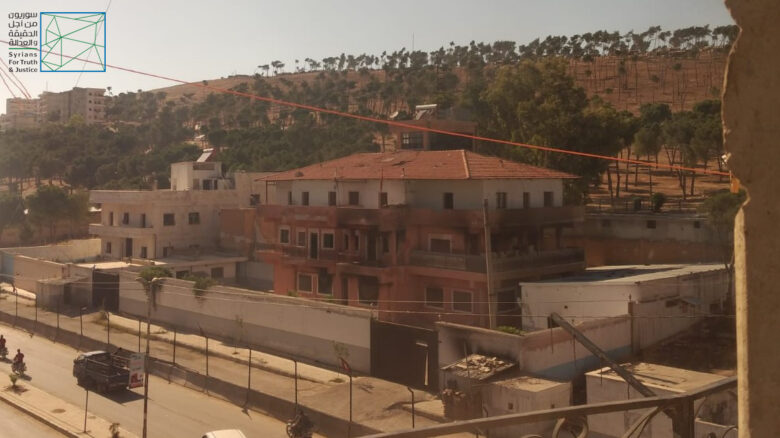
Image 9- headquarters of the Hamza Division in Mahmoudia street of Afrin.

Image 10 – Headquarters of Hamza/Hamzat Division in Afrin (set to fire / black square). The red square, however, points to the shop of the attacked displaced person.
According to several eyewitnesses, the direct reason for the attack was that Suliman al-Mubakhir and the guy working with him refused to sell stuff for a member of the Division on credit. Thus, a dispute arose between the latter and the shop worker, which led the Division member to go to the base of his group, which located in front of the shop and headed by Ahmed Zakkour, and bring four other members and a grenade, threatening to toss it in the shop, and that was indeed done by one of them Zakkour Juneidi. After the grenade exploded in the shop, the four members rowed in the middle of the street and directly shot the shop with their rifle emptying three magazines in it. On this, a witness said:
“After firing the shop, the leader of those members, Ahmed Zakkour, came, escorted by eight members, and tried to arrest the shop renter, his worker and his cousin. Then, people crowded, including displaced from eastern Ghouta, who are members of other armed groups. Answering the attack, the latter stormed the Hamza headquarters and burned a part of it, but the fighters inside managed to escape.”
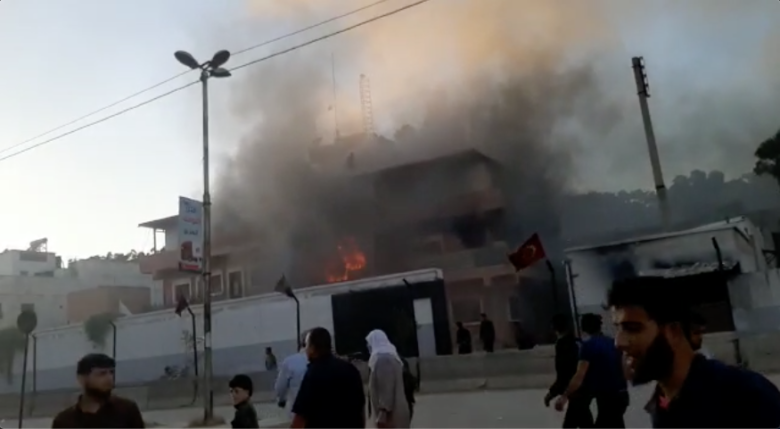
Image 11 – a photo circulated by local activists shows the headquarters of the Hamza Division in Mahmoudia street burning.
The indiscriminate shooting by the four members of the Division caused the death of a civilian called Jalal al-Zaghloul and a displaced child from the city of Ma`arat al-Nu`man, as well as the injury of a displaced woman, child and two men, who all reside in Afrin.
This incident caused a wave of resentment and condemnation among the displaced people in Afrin and other areas held by the National Army. Further, civil entities and local councils issued statements denying the incidents and demanding to hold the Hamza Division members accountable.
Relatives of the victim delegated two of them, who are Abu Yasser al-Ibri and Abdul-Wahab Abu Yahya, to negotiate with the Hamza Division’s overall military commander, Abdullah Halawa. The two parties agreed on handing over the perpetrators to the judiciary regardless of their positions, removing the members of the Division from the Mahmoudia headquarters outside Afrin until the end of the trial and to form a committee from members of both sides to look into the case. The Hamza Division also pledged to compensate those affected by what the judiciary rules.
A witness, who is fully informed of developments on this issue, confirmed that after the expiry of the time limit, the Hamza Division denied making an agreement through its negotiator Abdullah Halawa to resolve the outstanding issue. The Division also has not compensated any of the affected parties or held accountable any of its members responsible for the attack.
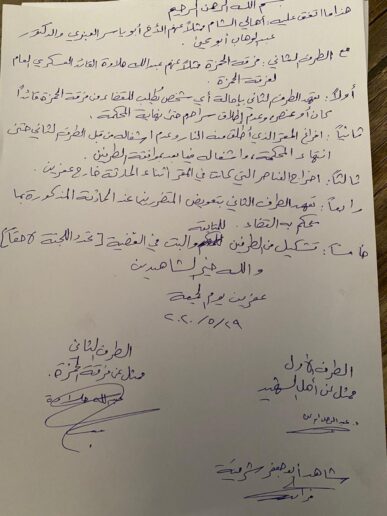
Image12- the agreement signed between the victim’s relatives and the Hamza Division. 29 May 2020.
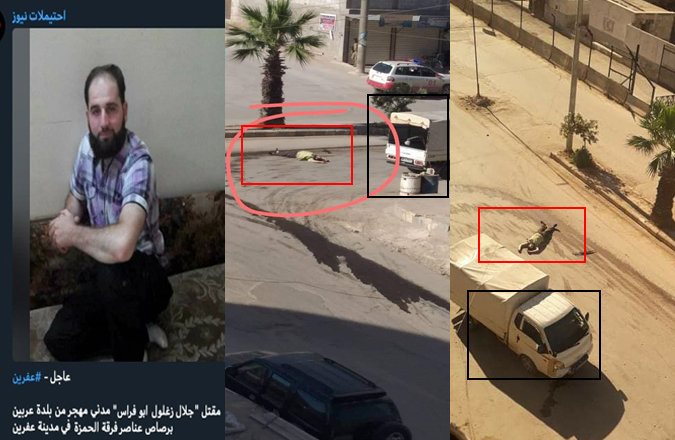
Image 13- the victim Jalal Zaghloul, who was killed in Afrin by the Hamza Division on 28 May 2020.
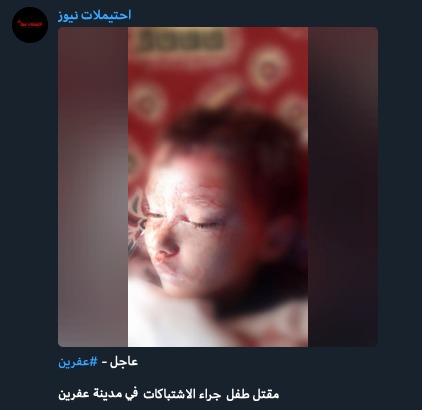
Image 14- a displaced child reportedly killed in Afrin by bullets of the Hamza Division on 28 May 2020. (STJ couldn’t identify the child or verify the photo).
[1] We note that the sources were met secretly and separately at different times by two different researchers of STJ. Both sources asked anonymity.
[2] “Illegal transfer of Dozens of Syrian detainees into Turkey following Operation Peace Spring”, STJ, 10 July 2020, https://stj-sy.org/en/illegal-transfer-of-dozens-of-syrian-detainees-into-turkey-following-operation-peace-spring/ (last visit: 10 July 2020).
[3] The GPS coordinates of the military headquarters of al-Hamza Division: 36.517285, 36.854998.
[4] STJ refrained from publishing the information obtained from the detainee’s family for concerns about their safety.

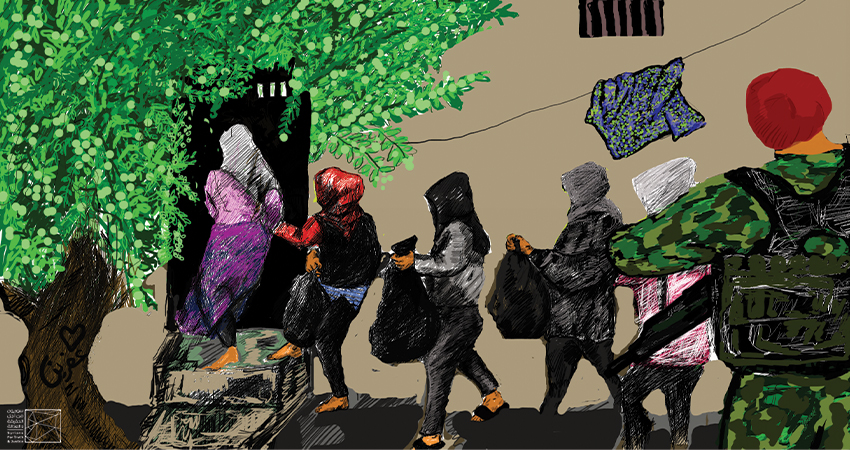
2 comments
[…] [14] STJ, “Afrin: How Eight Women were Forcibly Disappeared by the Hamza Division?”, 03 August 2020 (https://stj-sy.org/en/afrin-how-eight-women-were-forcibly-disappeared-by-the-hamza-division/). […]
[…] [14] STJ, “Afrin: How Eight Women were Forcibly Disappeared by the Hamza Division?”, 03 August 2020 (https://stj-sy.org/en/afrin-how-eight-women-were-forcibly-disappeared-by-the-hamza-division/). […]